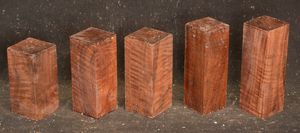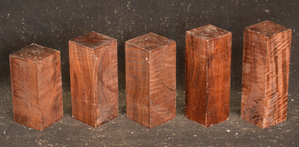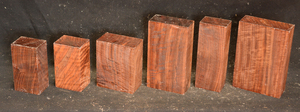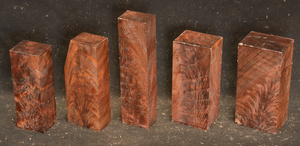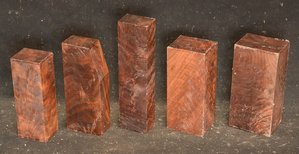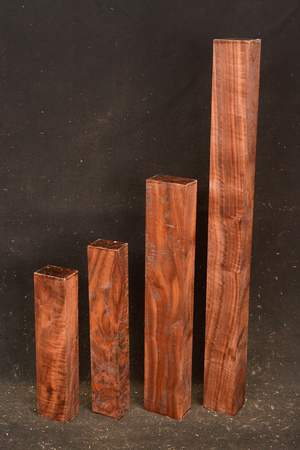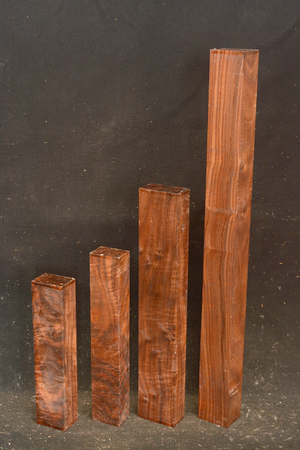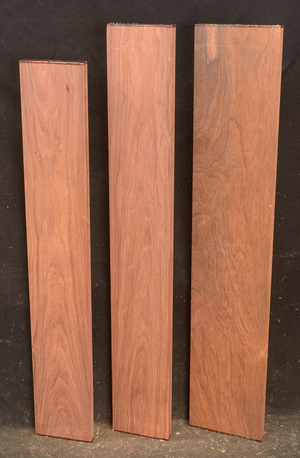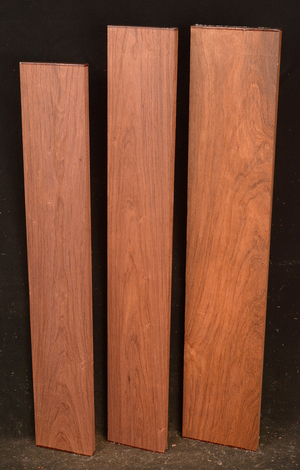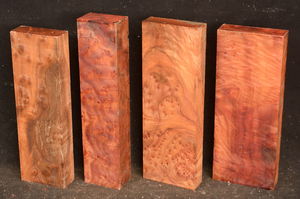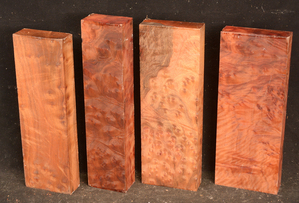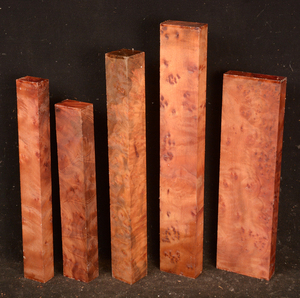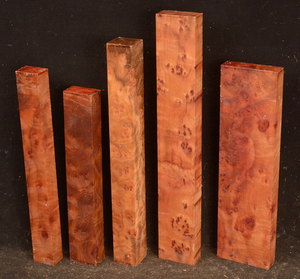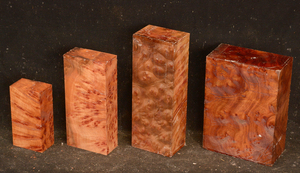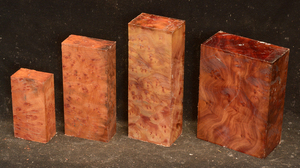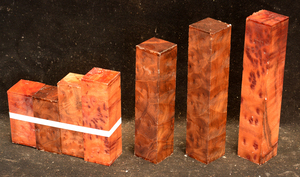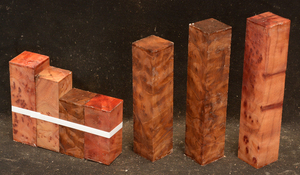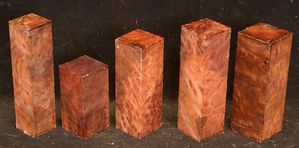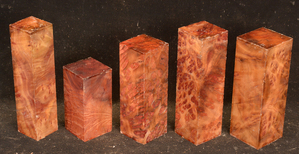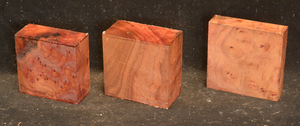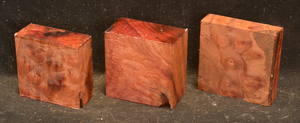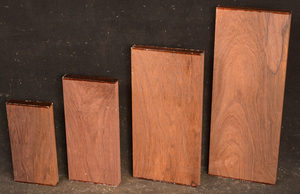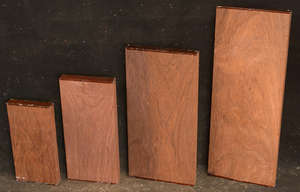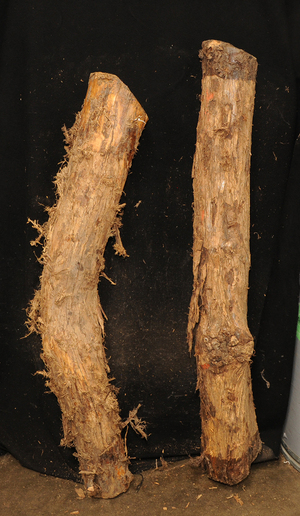Figured Claro Walnut
Juglans hindsii
A tree found in Southern Oregon and Northern California with the best material coming from the San Joaquin Valley. Lighter in color than Eastern Black Walnut (Juglans regia) it is often found with curly and quilted figure. Burly stumps are also a valuable source of wood for veneers, gunstocks, and wood turning blanks.
Item Number: W43355
Figured Claro Walnut
Juglans hindsii
A tree found in Southern Oregon and Northern California with the best material coming from the San Joaquin Valley. Lighter in color than Eastern Black Walnut (Juglans regia) it is often found with curly and quilted figure. Burly stumps are also a valuable source of wood for veneers, gunstocks, and wood turning blanks.
Item Number: W43354
Feather Crotch Figured Claro Walnut
Juglans hindsii
A tree found in Southern Oregon and Northern California with the best material coming from the San Joaquin Valley. Lighter in color than Eastern Black Walnut (Juglans regia) it is often found with curly and quilted figure. Burly stumps are also a valuable source of wood for veneers, gunstocks, and wood turning blanks.
These feather crotches show on both sides of these pieces.
Item Number: W43353
Figured Claro Walnut
Juglans hindsii
A tree found in Southern Oregon and Northern California with the best material coming from the San Joaquin Valley. Lighter in color than Eastern Black Walnut (Juglans regia) it is often found with curly and quilted figure. Burly stumps are also a valuable source of wood for veneers, gunstocks, and wood turning blanks.
Item Number: W43352
Guatemalan Rosewood
Dalbergia tucarensis
This Rosewood species has a reddish-brown to dark brown colored heartwood contrasting the almost white sapwood. The dust has a sweet odor. It is an excellent furniture/case works/jewelry box wood and even though it has a medium texture it does take a nice polish. We also offer it as a musical instrument wood (see guitar fingerboards and backs & sides elsewhere on the site). It has a very "crisp" tap tone with good sustain.
Due to CITES regulations, we can only ship this species to customers in the United States.
Item Number: W43351
Camphor Burl
Cinnamomum sp.
This rare burl is from S.E. Asia and is seldom seen on the world market. It is fine-grained and varies in color from a light reddish-brown to almost scarlet. It is easy to work and has a very pungent, spicy scent. For a burl it is remarkably stable. Green to partially air dried.
Item Number: W43347
Camphor Burl
Cinnamomum sp.
This rare burl is from S.E. Asia and is seldom seen on the world market. It is fine-grained and varies in color from a light reddish-brown to almost scarlet. It is easy to work and has a very pungent, spicy scent. For a burl it is remarkably stable. Green to partially air dried.
Item Number: W43346
Camphor Burl
Cinnamomum sp.
This rare burl is from S.E. Asia and is seldom seen on the world market. It is fine-grained and varies in color from a light reddish-brown to almost scarlet. It is easy to work and has a very pungent, spicy scent. For a burl it is remarkably stable. Green to partially air dried.
Item Number: W43344
Camphor Burl Bundle & Turning Squares
Cinnamomum sp.
This rare burl is from S.E. Asia and is seldom seen on the world market. It is fine-grained and varies in color from a light reddish-brown to almost scarlet. It is easy to work and has a very pungent, spicy scent. For a burl it is remarkably stable. Green to partially air dried.
A has 4 pieces.
Item Number: W43342
Camphor Burl Turning Squares
Cinnamomum sp.
This rare burl is from S.E. Asia and is seldom seen on the world market. It is fine-grained and varies in color from a light reddish-brown to almost scarlet. It is easy to work and has a very pungent, spicy scent. For a burl it is remarkably stable. Green to partially air dried.
Item Number: W43341
Camphor Burl Bowl Blanks
Cinnamomum sp.
This rare burl is from S.E. Asia and is seldom seen on the world market. It is fine-grained and varies in color from a light reddish-brown to almost scarlet. It is easy to work and has a very pungent, spicy scent. For a burl it is remarkably stable. Green to partially air dried.
Item Number: W43339
Guatemalan Rosewood
Dalbergia tucarensis
This Rosewood species has a reddish-brown to dark brown colored heartwood contrasting the almost white sapwood. The dust has a sweet odor. It is an excellent furniture/case works/jewelry box wood and even though it has a medium texture it does take a nice polish. We also offer it as a musical instrument wood (see guitar fingerboards and backs & sides elsewhere on the site). It has a very "crisp" tap tone with good sustain.
Due to CITES regulations, we can only ship this species to customers in the United States.
Item Number: W43334
Coastal California Redwood Cube
Sequoia sempervirens
These often times enormous trees are some of the largest living organisms on earth. They thrive in the fog belt along the northern Pacific coast in California. The heartwood is pink to a deep reddish brown. The wood is soft, easily worked, and exceptionally durable.
It is a little larger than the dimensions below reflect, but it does also have some surface dents which is why we measured it as we did. Does have some other defects such as cracks. Old and dry.
Item Number: W43329
Spalted Padouk
Pterocarpus soyauxii
This brick-red colored West African hardwood was once one of the more common imported hardwoods but has become increasingly scarce in the last couple of years. It is easy to work, takes a nice polish and is dimensionally stable.
The spalting doesn't get into the red heartwood, just the lighter colored sapwood.
Item Number: W43326
Lightly Figured Castello Boxwood
Calycophyllum multiflorum
Castello Boxwood, though not a true Buxus species, still has a very fine texture and a lovely light canary yellow color. This is truly a dream wood to mill.It is an excellent turnery wood, capable of very fine detail. Also very popular for making scale timbers and other parts for model ships. Air-dried.
Item Number: W43324
Camphor Burl
Cinnamomum sp.
This rare burl is from S.E. Asia and is seldom seen on the world market. It is fine-grained and varies in color from a light reddish-brown to almost scarlet. It is easy to work and has a very pungent, spicy scent. For a burl it is remarkably stable. Green to partially air dried.
Item Number: W43320
Camphor Burl Thins Bundles
Cinnamomum sp.
This rare burl is from S.E. Asia and is seldom seen on the world market. It is fine-grained and varies in color from a light reddish-brown to almost scarlet. It is easy to work and has a very pungent, spicy scent. For a burl it is remarkably stable. Green to partially air dried.
A has 3 pieces.
B has 4 pieces.
C has 3 pieces.
Item Number: W43318
Camphor Burl Turning Squares
Cinnamomum sp.
This rare burl is from S.E. Asia and is seldom seen on the world market. It is fine-grained and varies in color from a light reddish-brown to almost scarlet. It is easy to work and has a very pungent, spicy scent. For a burl it is remarkably stable. Green to partially air dried.
Item Number: W43316
East Indian Rosewood
Dalbergia latifolia
This is grown on plantations in Indonesia where it is called Sonokeling. These came from a tree large enough and old enough to look much like the old-growth lumber from India.
Due to CITES regulations, we can only ship this species to customers in the United States.
Item Number: W43314
Figured Bubinga
Guibourtia tessmannii
Called by some woodworkers African Rosewood, Bubinga is a deep, lustrous, brownish-red color with a fine, darker striping. The figure makes the wood doubly beautiful. It is very hard and heavy and takes a glassy, smooth finish.
Due to CITES regulations, we can only ship this species to customers in the United States.
Item Number: W43307
American Cherry
Prunus serotina
Cherry is one of our most valuable hardwoods. It's beautiful rich color and luster, dimensional stability, and strength all combine to make Cherry an excellent furniture wood.
We just received a large shipment of 8/4 Cherry, all 12" and wider, a rarity these days. Please call for pricing.
Item Number: W43306
American Cherry
Prunus serotina
Cherry is one of our most valuable hardwoods. It's beautiful rich color and luster, dimensional stability, and strength all combine to make Cherry an excellent furniture wood.
We just received a large shipment of 8/4 Cherry, all 12" and wider, a rarity these days. Please call for pricing.
Item Number: W43305
Tennessee Red Cedar
(Juniperus virginiana)
Famous for its fragrance and use as chest and closet linings. It is generally knotty, machines quite nicely except for some grain tear-out around knots, is very stable in service, resistant to decay and is said to repel moths and other insects.
Item Number: W43304
Figured European Pearwood
Pyrus communis
Almost all Pearwood imported into the U.S.A. has been steamed to bring out a more pinkish-red color and to prevent drying stresses. Formerly the wood was used for carving, turning, drawing instruments, wood engravings, textile printing blocks, and tool handles. Stained black it is an excellent substitute for Ebony. Contemporary uses include woodwinds such as recorders, furniture, kitchen accessories, jewelry and other boxes, and architectural uses such as paneling and doors.
A has a corner cut off.
Item Number: W43297
Figured European Pearwood
Pyrus communis
Almost all Pearwood imported into the U.S.A. has been steamed to bring out a more pinkish-red color and to prevent drying stresses. Formerly the wood was used for carving, turning, drawing instruments, wood engravings, textile printing blocks, and tool handles. Stained black it is an excellent substitute for Ebony. Contemporary uses include woodwinds such as recorders, furniture, kitchen accessories, jewelry and other boxes, and architectural uses such as paneling and doors.
A has some wane on one corner.
B has a little wane on one corner.
Item Number: W43296
Figured European Pearwood
Pyrus communis
Almost all Pearwood imported into the U.S.A. has been steamed to bring out a more pinkish-red color and to prevent drying stresses. Formerly the wood was used for carving, turning, drawing instruments, wood engravings, textile printing blocks, and tool handles. Stained black it is an excellent substitute for Ebony. Contemporary uses include woodwinds such as recorders, furniture, kitchen accessories, jewelry and other boxes, and architectural uses such as paneling and doors.
B and C a little wane on one corner.
Item Number: W43295
Bird's-eye Maple
Acer saccharum
The heartwood is white or cream to light brown or reddish brown. Figured somewhat like that of burl with many small eyes separate from each other. Hard and heavy, 45 lbs/cu ft. Easy to work and takes a smooth polish. U.S.A.
Item Number: W43289
Narra
Pterocarpus indicus
Also called New Guinea Rosewood. It is a beautiful, highly lustrous golden yellow color sometimes with reddish streaks. A nice turning wood it is also used in furniture, jewelry boxes, handles, etc. It is easy to work and glue and takes a nice polish.
Item Number: W43287
Figured European Pearwood
Pyrus communis
Almost all Pearwood imported into the U.S.A. has been steamed to bring out a more pinkish-red color and to prevent drying stresses. Formerly the wood was used for carving, turning, drawing instruments, wood engravings, textile printing blocks, and tool handles. Stained black it is an excellent substitute for Ebony. Contemporary uses include woodwinds such as recorders, furniture, kitchen accessories, jewelry and other boxes, and architectural uses such as paneling and doors.
A has wane on one edge.
Item Number: W43283
Ribbon Striped Sapele Bowl Blanks
Entandrophragma cylindricum
The Sapele tree is found in tropical West & Central Africa. Even when without figure as this board Sapele has an amazing luster and takes a beautiful polish.
Item Number: W43282
Figured African Blackwood Turning Squares
Dalbergia melanoxylon
The heartwood is purplish to brownish-black with dark gray streaks giving an overall impression of being black. Lustrous with an attractive inner chatoyance. Very hard, heavy, close-grained, and virtually free from pores. Its stability and lovely tonal qualities make it an excellent instrument wood.
Due to CITES regulations, we can only ship this species to customers in the United States.
Click on the photos to see high resolution close-ups of the figure in each square.
Item Number: W43278
Figured African Blackwood Turning Squares
Dalbergia melanoxylon
The heartwood is purplish to brownish-black with dark gray streaks giving an overall impression of being black. Lustrous with an attractive inner chatoyance. Very hard, heavy, close-grained, and virtually free from pores. Its stability and lovely tonal qualities make it an excellent instrument wood.
Due to CITES regulations, we can only ship this species to customers in the United States.
Click on the photos to see high resolution close-ups of the figure in each square.
Item Number: W43277
Figured African Blackwood Turning Squares
Dalbergia melanoxylon
The heartwood is purplish to brownish-black with dark gray streaks giving an overall impression of being black. Lustrous with an attractive inner chatoyance. Very hard, heavy, close-grained, and virtually free from pores. Its stability and lovely tonal qualities make it an excellent instrument wood.
Due to CITES regulations, we can only ship this species to customers in the United States.
Click on the photos to see high resolution close-ups of the figure in each square.
Item Number: W43276
Padouk Turning Squares
Pterocarpus soyauxii
This brick-red colored West African hardwood was once one of the more common imported hardwoods but has become increasingly scarce in the last couple of years. It is easy to work, takes a nice polish and is dimensionally stable.
Item Number: W43274
Padouk Bowl Blanks
Pterocarpus soyauxii
This brick-red colored West African hardwood was once one of the more common imported hardwoods but has become increasingly scarce in the last couple of years. It is easy to work, takes a nice polish and is dimensionally stable.
Item Number: W43273
Spanish Cedar
Cedrela sp.
Also called Cigar Box Cedar because of its aromatic scent and its wide use in tobacco humidors. It resembles the wood of South American Mahogany to which it is related. Heartwood color varies from a light pinkish brown to reddish brown. It is fairly light in weight.
Due to CITES regulations, we can only ship this species to customers in the United States.
Item Number: W43272
Ziricote Turning Squares
Cordia dodecandra
Ziricote is another timber we get from the Yucatan Peninsula of Mexico. It is a lovely wood with a very pronounced ray fleck on radial surfaces sometimes producing a "landscape" effect much like picture jasper.
Item Number: W43271
Ziricote
Cordia dodecandra
Ziricote is another timber we get from the Yucatan Peninsula of Mexico. It is a lovely wood with a very pronounced ray fleck on radial surfaces sometimes producing a "landscape" effect much like picture jasper.
Item Number: W43269
Ziricote Thins
Cordia dodecandra
Ziricote is another timber we get from the Yucatan Peninsula of Mexico. It is a lovely wood with a very pronounced ray fleck on radial surfaces sometimes producing a "landscape" effect much like picture jasper.
Item Number: W43268
Shedua Bowl Blanks
Guibourtia sp.
Also called Ovangkol and Amazakoue. This wood is increasingly becoming popular as an acoustic guitar wood. The color varies from a rich, golden brown to a lustrous grayish brown usually with a black stripe.
Item Number: W43267
Hawaiian Koa Turning Blank
Acacia Koa
This species is found almost exclusively in the Hawaiian Islands. It ranges in color from a pale brown to a reddish brown to a very dark, almost chocolate brown. It has a texture similar to Walnut but is easier to work. Can be highly chatoyant or lustrous. Highly sought after for use in musical instruments, especially guitars and ukuleles. Koa is becoming rare.
This piece does have some sap on the edges as well as some bug holes in the sap. The pith of the log does run from side to side as visible in one of the photographs. Give us a call if you have any quesitons. 503-274-1271.
Item Number: W43264
Figured Bubinga
Guibourtia tessmannii
Called by some woodworkers African Rosewood, Bubinga is a deep, lustrous, brownish-red color with a fine, darker striping. The figure makes the wood doubly beautiful. It is very hard and heavy and takes a glassy, smooth finish.
Due to CITES regulations, we can only ship this species to customers in the United States.
Item Number: W43262
Black Mesquite
Prosopis nigra
A very few pieces of Mesquite are figured with what we call frog's-hair curl, a small, tight curl with as many as 12-15 curls per inch. A very stable wood. Air-dried.
B has some wonderful figure.
Item Number: W43260
Thuya Burl Turning Squares
Tetraclinis articulata
This comes from the Atlas mountains in Morocco and has a beautiful golden chatoyance. Its color varies from a rich, lustrous golden brown to nearly black. Thuya burl is hard and dense with a high oil content, but tends to be brittle. The eyes, perfectly round, are scattered about in some burls like the figure in bird's-eye maple; in others they are grouped as islands. Due to it's desert occurrence, the wood sometimes contains small defects or inclusions but most can be repaired with cyanoacrylate (super) glues. A rare species, this exquisite wood is used for inlays, small boxes, turnery, and precious objects.
Item Number: W43259
Figured Sapele
Entandrophragma cylindricum
The Sapele tree is found in tropical West & Central Africa. Even when without figure as this board Sapele has an amazing luster and takes a beautiful polish.
Item Number: W43258
West African Ebony Turning Squares
Diospyros crassiflora
Sometimes called Gabon or Gaboon, this Ebony is sometimes jet black but oftentimes has grayish streaks that mostly disappear when finished or after the made object has been put into service. This Ebony has a marked resistance to checking that is characteristic of some of the Indian and Asian species. It has a wonderful texture and is easily carved, planed, turned, and milled. It is fairly fine-grained and takes a high polish. This Ebony usually originates in either Cameroon or Nigeria and the logs are rough hewn in the forest and oftentimes brought to the nearest road by human porters. With the disappearance of other species of black Ebony this species is fast becoming the Ebony of choice.
Item Number: W43257
West African Ebony Turning Squares
Diospyros crassiflora
Sometimes called Gabon or Gaboon, this Ebony is sometimes jet black but oftentimes has grayish streaks that mostly disappear when finished or after the made object has been put into service. This Ebony has a marked resistance to checking that is characteristic of some of the Indian and Asian species. It has a wonderful texture and is easily carved, planed, turned, and milled. It is fairly fine-grained and takes a high polish. This Ebony usually originates in either Cameroon or Nigeria and the logs are rough hewn in the forest and oftentimes brought to the nearest road by human porters. With the disappearance of other species of black Ebony this species is fast becoming the Ebony of choice.
Item Number: W43256
Snakewood Pen Blank Bundles
Piratinera guianensis
Also called Letterwood and Leopardwood. Color: dark red to reddish brown with irregular black speckles or stripes. Fine textured and highly lustrous. Very hard and heavy, 75-84 lbs/cu ft. Takes a beautiful finish. Very rare and very expensive. Guyana and Surinam.
Each bundle has 6 pieces.
Item Number: W43254
Snakewood Pen Blank Bundles
Piratinera guianensis
Also called Letterwood and Leopardwood. Color: dark red to reddish brown with irregular black speckles or stripes. Fine textured and highly lustrous. Very hard and heavy, 75-84 lbs/cu ft. Takes a beautiful finish. Very rare and very expensive. Guyana and Surinam.
Each bundle has 5 pieces.
Item Number: W43253
Cocuswood Logs
Brya ebenus
This extremely rare species is found in Cuba, Jamaica, and the Dominican Republic. Also called Green, Brown, or West Indian Ebony. The heartwood is brownish-yellow to dark brown often with a greenish tinge. It is usually beautifully veined with darker streaks. The wood is hard and heavy weighing 68 to 80 lbs/cubic foot. This high density contributes to its wonderful acoustic properties-it fairly rings when struck. It is well known for its use in woodwinds such as flutes, piccolos, and bagpipes because of its fine and uniform grain, its beautiful coloring and its resonance.
These logs do have a lot of defects as seen in the photos. When we mill these logs, we do get some nice squares, but it is tricky work cutting around all the cracks. If you have any questions, please don't hesitate to call or email.
Item Number: W43247

